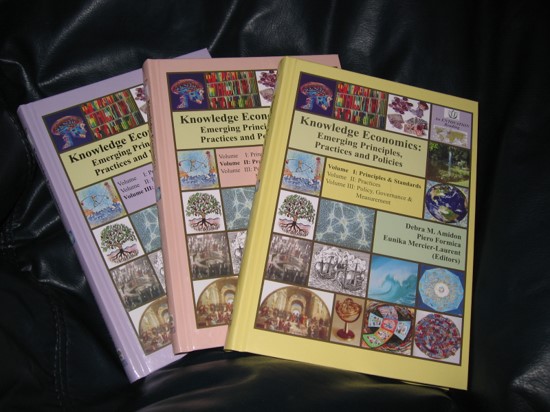
The E100 Readings on Knowledge Economics: Principles, Practices and Policies
Tartu University Press
Debra M. Amidon, Piero Formica, and Eunika Mercier-Laurent (Editors)
ISBN: 9985-56-939-3
Knowledge economics is the new focus for the 21st century.
-Peter F. Drucker
The purpose of this tri-volume set of books is to provide timely readings to educate the new generation of researchers, professors and teachers, as well as industrial and government leadership professionals. The compilation includes the most compelling writing from 27 leading author contributors from the ENTOVATION Network representing Australia, Brazil, Canada, China, Croatia, Estonia, France, Germany, Israel, Malaysia, Mexico, Spain, Sweden, Turkey, United Arab Emirates, United Kingdom and United States.
The principles of knowledge economics should be endorsed as a revolutionary change - an opportunity to provide a solid foundation, rationale and vision to substitute something more sustainable than the old regime of traditional economics. Intelligent and innovative explorations of computer capabilities optimize individual and collective work of employees and the entrepreneur. Collectively, the writings document the evolution of three laws of knowledge dynamics: the 1st based upon knowledge, the 2nd based upon innovation and the 3rd defining the value of collaborative advantage.
The trilogy is divided into three major volumes - each providing a facet of the new thinking:
Volume I: Principles/Standards
We are witnessing an acceleration of experimentation and adoption of progressive management approaches at every level of the economic - micro, meso, and macro-economic. This section will illuminate some of the broader scheme context and sense-making approaches to initiatives of the new Knowledge Economy. Topical areas include trend analysis, modern economic principles, emerging standards, etc.
Knowledge Partnerships for a Sustainable, Equitable, and Stable Society
Thomas F. Malone, North Carolina State University, and Dr. Gary W. Yohe, Wesleyan UniversityDriving Force for Sustainable Development: Principles of Harmony and Balance
Jin Zhouying, Chinese Academy of Social SciencesDynamic Model of Production and the Evolution of Knowledge Economy
Darius MahdjoubiA Biosoma Precis
George Bugliarello, Foreign Secretary of the U.S. National Academy of EngineeringThe Six Facets of Innovation Management
Edna Pasher, Edna Pasher Associates, and Ron Dvir, Innovation EcologySome Emerging Perspectives of Leadership for Value Creation
Leif Edvinsson, UNIC and the University of LundKnowledge Pattern Recognition
Bryan Davis, Kaieteur Institute for Knowledge ManagementA Knowledge Management Success Story Using Social Cybernetics
W. De Gregori, UCC: Universidad Cooperativa de ColombiaStories, Mental Models and Situation-Handling
Karl M. Wiig, Knowledge Research Institute, Inc.A Global Knowledge Agenda Based on Capital Systems
Dr. F. Javier Carrillo, World Capital Institute
Volume II: Practices
This section identifies management approaches that are enabling institutions to take advantage of the new models of organization structures, real-time learning mechanisms, foundations for cultural evolution, performance incentives, environmental considerations, ecological practices, country and company restructuring, and the use of technology.
Liberating the Innovation Value of Communities of Practice
George Pór, Researcher at London School of Economics and Chairman, Community Intelligence Ltd. in collaboration with Erik van Bekkum, Senior Consultant, Community Intelligence Ltd.Extended Enterprises Based on Knowledge: CONEX
Angel A. Ortiz and Carlos F. Isoird, MIK - Mondragón Innovation and KnowledgeEnterprise Transformation Using Knowledge and Innovation Strategies
Lynne Schneider, ESSI, Inc.The Knowledge Management Strategy Vee: A Framework for Creating a New Strategic Direction
Xenia Stanford, KnowMapLearning Leverage: Managing Knowledge for Competitive Advantage
John Milton-Smith, School of Management, Curtin University of Technology, Perth, Western AustraliaIn Search of Permanency: Internet Biologists and Continuity in Virtual Knowledge Network
Chin Hoon Lau, Lagenda Knowledge SystemsGlobal Knowledge Innovation at Work: The computer seen as an intelligent assistant of humans in the Global Innovation Process of an extended organization
Eunika Mercier-Laurent, EMC ConseilHuman Resources Management in the Web Economy
Jean-Marc Le Duc, Transinnova, French Ministry of Education and Technology
Volume III: Policy and Measurement
The policy section outlines how the emphasis on policy guiding procedures for action can effect significant managerial innovations: changing - or better - abandoning the old rules, thereby producing new and viable principles of economic policy. This is a counterpart to the principles of self-organizing systems in that there may be ways to architect, via policy-change initiatives - the potential output of an innovation system.
Knowledge-Relevant Economic Policy: Analysing Knowledge Policymaking in Managed - and Free - Market Economies
Piero Formica, International University of Entrepreneurship, University of Tartu and Abu Dhabi Men's Higher College of TechnologyRegional Technology Policy and the Emergence of an R&D System in the Basque Country
Monica Moso, Knowledge Cluster, and Mikel Olazaran, Department of Sociology, Faculty of Social and Communication Sciences, University of the Basque CountryShaping Innovation Policy of Small Transition Economy: Global Leverage of Knowledge and Competencies
Tõnis Mets, Faculty of Economics and Business Administration, University of TartuTransparency: A Foundation for Modern Leadership/Governance
Doug Macnamara, Banff Executive Leadership Inc.Moving beyond Compliance and Control: Building a Values-Based Corporate Governance Culture. A Culture of Mutual Accountability
Eleisa Sundrum, eCultureTeamCollaboredge: The Key to Development
Gülgün KayakutluIntellectual Capital Efficiency (ICE) Index- New Implications for GDP
Ante Pulic, International Business Efficiency Consulting LLC, USANational Intellectual Capital Index: The Benchmarking of Arab Countries
Nick Bontis, DeGroote Business School, McMaster UniversityIn the Knowledge Zone: Architecting a Blueprint for the World Trade of Ideas
Debra M. Amidon, ENTOVATION International. Ltd
